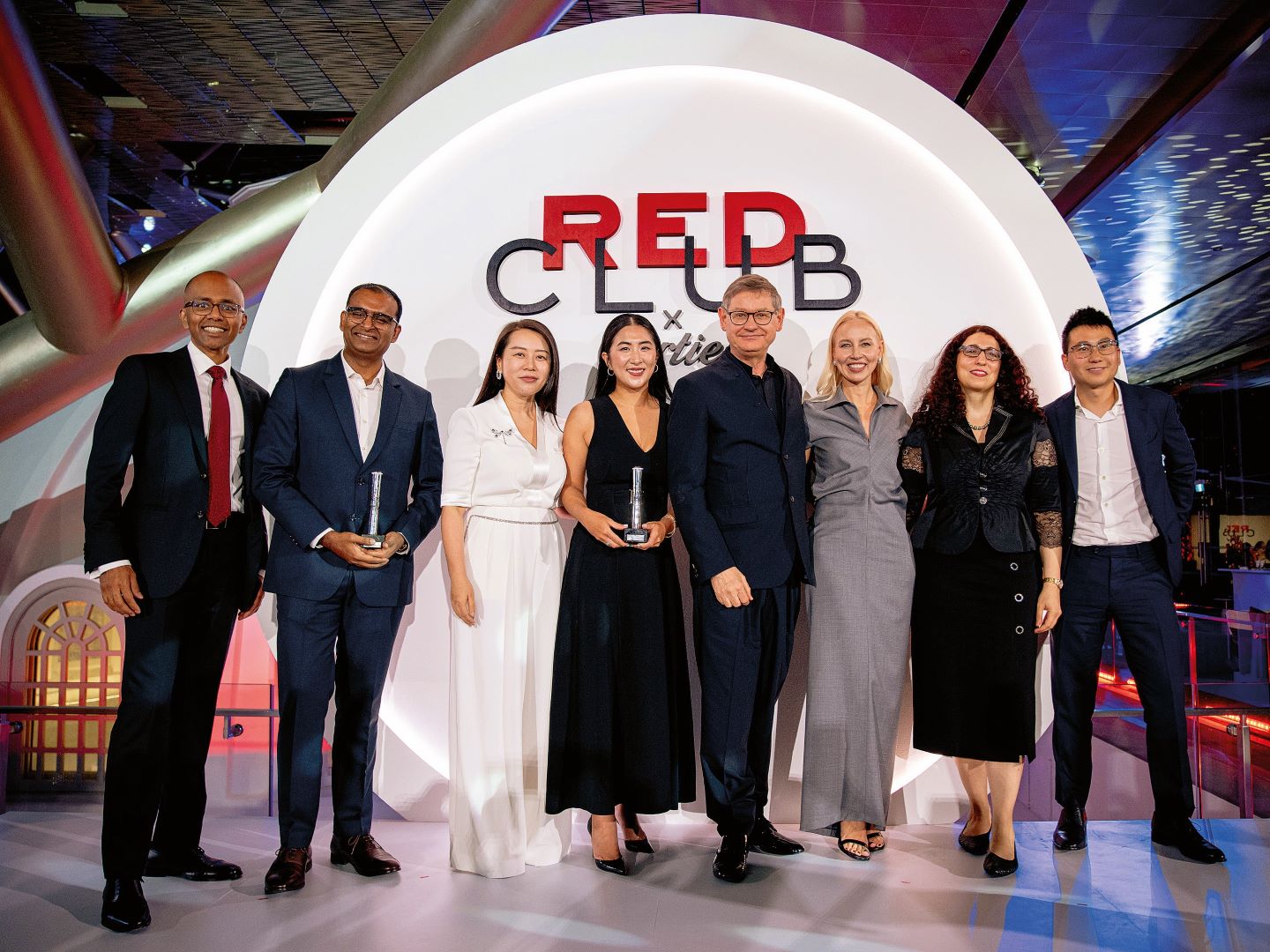
From left: Suresh Cuganesan (deputy dean, professor of strategy, innovation and entrepreneurship, Th e University of Sydney Business School), Suraj Nandakumar, Lu Zhang, Didi Gan, Cyrille Vigneron, Yanina Novitskaya, Jumana Zahalka (deputy dean, NUS Business School) and Richard Li (Photo: Cartier)
Precisely five hours before the winner of Red Club x Cartier’s Young Leader Award (YLA) 2024 was announced in the dandified halls of the National Gallery Singapore, Suraj Nandakumar is recounting, over a spot of tea, the tribulations of being an entrepreneur and how his decade-long efforts would be distilled into a single moment on stage that evening.
“To be [among] the four finalists and shortlisted under this year’s theme ‘Tech for a Sustainable Future’ is a very humbling experience. After all, we work in the very non-sexy space of landfills,” admits the co-founder and CEO of Recity Network, a circular plastic asset management company based in India that delivers environmental and economic value through ethically sourced, traceable post-consumer recyclables.
“Do you know what I face daily? I’m surrounded by all the filth in the world. My job is nowhere close to luxury or fashion so the feeling of being recognised by a global organisation like Cartier means a lot. No matter what relationship you are in, work or personal, the most primordial emotion everyone seeks is to be seen. Winning the YLA would validate all our doubts and breakthroughs.”
Cartier did more than just notice this urban planner and architect by training, who has more than 12 years’ experience in city planning and implementing infrastructure projects worth over US$26 billion (RM118.9 billion). In a surprise twist, he was presented the top prize alongside Didi Gan of N&E Innovations, Singapore, who developed an edible antimicrobial agent derived from upcycled food waste. The joint winners — a first for the awards initiated in 2021 to support those aged 20 to 40 who are leading socially impactful businesses — will receive a grant of €50,000 (RM233,630) each, in addition to international exposure, media visibility, and a tailored mentorship programme by this edition’s education partners, the National University of Singapore Business School and The University of Sydney Business School.
1_14.jpg
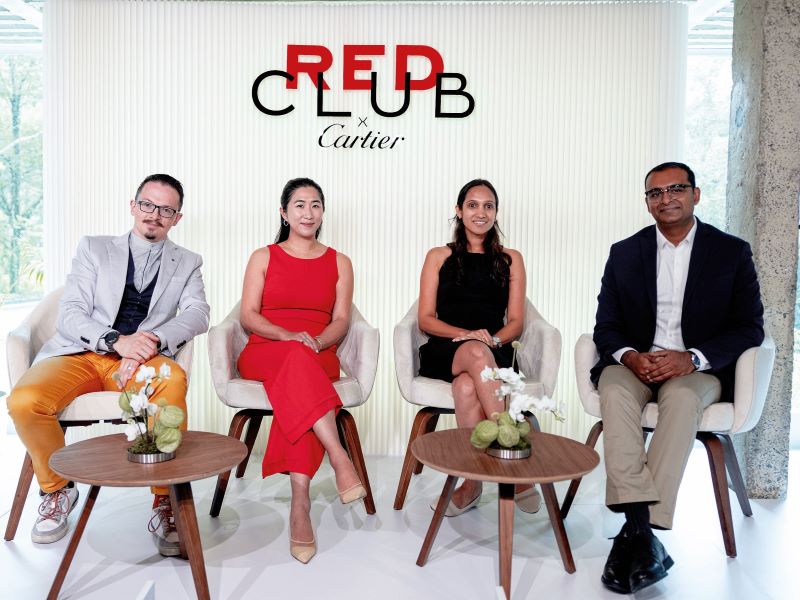
Asked about his feelings backstage as one of the evening’s freshly minted honourees, Nandakumar, with the weight of the award still awkward in his hands, modestly replies: “It’s a private dream that has become a public reality. I’m just the outcome. The real people who are overcoming all these hardships and making things work are my co-founder [Meha Lahiri] and my team. I’m so grateful.”
Gan, who spent time at her grandfather’s nut factory as a child and saw vast amounts of food being discarded and burnt, plans to channel the money she received into her company’s research and development department. “I’m deeply appreciative of being part of this year’s YLA, which empowers me to drive change towards a more sustainable planet by reducing the use of harmful chemicals.” N&E, which offers an alternative to traditional disinfectants that significantly reduces carbon emissions, aims to recycle at least 10,000 tonnes of food waste by 2030.
Also aiming to invest part of their €10,000 grant in research are runners-up Enrico Di Oto, founder of OACP, Italy, known for devising rapid cancer diagnosis through advanced chemical and biotechnological solutions; and Aasawari Kane, founding member and head of growth at PadCare Labs, India, which recycles sanitary napkins into valuable materials such as plastic pellets to make tabletops and plant pods.
Modern entrepreneurship is a far cry from the archetype of a business magnate gazing out from a gleaming corner office. Today’s entrepreneurs, by contrast, eschew sclerotic management and speak in terms that would have felt foreign just a generation ago: carbon footprint, social equity and circular economy. Earnest in their ambitions, these pathbreakers are not merely looking to make a mark but also to leave the world a little better and kinder than they found it. These days, it takes a creative problem solver with ethical fibre to commit to a dual bottom line: Balancing profit with purpose.
“Many years ago, I was asked [as a Young Global Leader by the World Economic Forum] in Davos if I would compromise financial return for social impact. I was like, ‘Why? We can achieve both!’ This is the kind of mentality we should promote among young aspirants,” urges Fusion Fund founder and Silicon Valley-based investor Lu Zhang during a sharing session at the ceremony. The 31-year-old, who built a medical device company for Type II diabetes diagnosis based on her graduate school research at Stanford University, is also on the jury board of the YLA and Cartier Women’s Initiative (CWI).
didi-gan_new.jpg
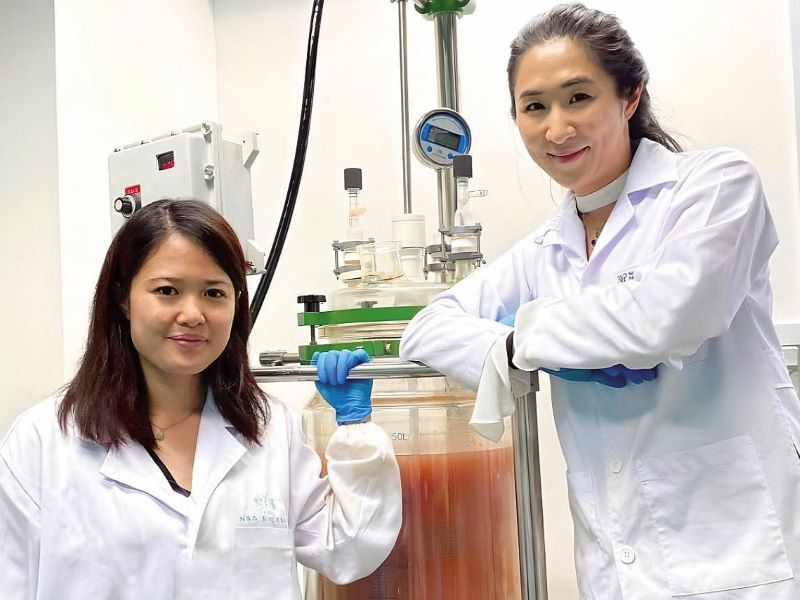
The genius of Silicon Valley, which celebrates failure as a nursery school for success, is that it frowns at conventional flops and cultivates a destigmatised space for unconventional success. But not everyone gets to experience a rich learning environment, laden with organisational and personal enhancement. What can struggling entrepreneurs do when they strike out on their own? Head of Red Club x Cartier Sydney chapter Richard Li has the perfect answer.
“Don’t be afraid to fail. But more importantly, always surround yourself with those who are smarter than you. Doing so has been transformative in my career because having a strong network of like-minded people or even a trusty co-founder can affirm your ideas. Solving problems on your own may not be the best way,” suggests the brains behind Australia’s luggage empire July, who bet on himself before anyone else was willing to.
Motivational stories swirling around during the two-hour ceremony underscored the maison’s ethos of looking at problems as not inconveniences but opportunities. Former CEO Cyrille Vigneron, now chairman of Cartier Culture and Philanthropy, summed up the night — where the air was heavy with ambition and the 150-strong audience rapt — in a fitting speech.
“Social entrepreneurship does not come from a top-down, big policy that immediately aims to change the world. But it is made up of leaders who identify setbacks and hurdles in their daily lives or community, and pinpoint ‘there is something to do here’. We are honoured to support these extraordinary individuals making a tangible difference by inventing solutions across sectors, stimulating economic progress while improving environmental and social well-being.”
Brilliant facets
Be it championing causes or handing out accolades to those who advocate them, luxury brands want to be seen as a platform for dialogue rather than just a place to transact. Industry titans are adapting, keenly aware that their future depends on aligning their business practices with the values they espouse. Although YLA is drawing attention to public issues, such as the burdens and blessings of modern science this year, how else can the award evolve to help us behave more responsibly towards people and the planet without turning into a polished marketing campaign?
“It’s very important to stress that the development of YLA happened organically. It was formed by the Red Club, a young multicultural community fuelled by intense energy and open-mindedness to do something. There isn’t a need to ‘artificially’ push them because the members are united to make a change, just like why CWI has existed for 18 years. There are many areas and global issues that need to be highlighted. We can, perhaps, focus on education next,” CEO of Southeast Asia and Oceania Yanina Novitskaya says, explaining how the YLA is a project close to her heart.
yanina.jpg
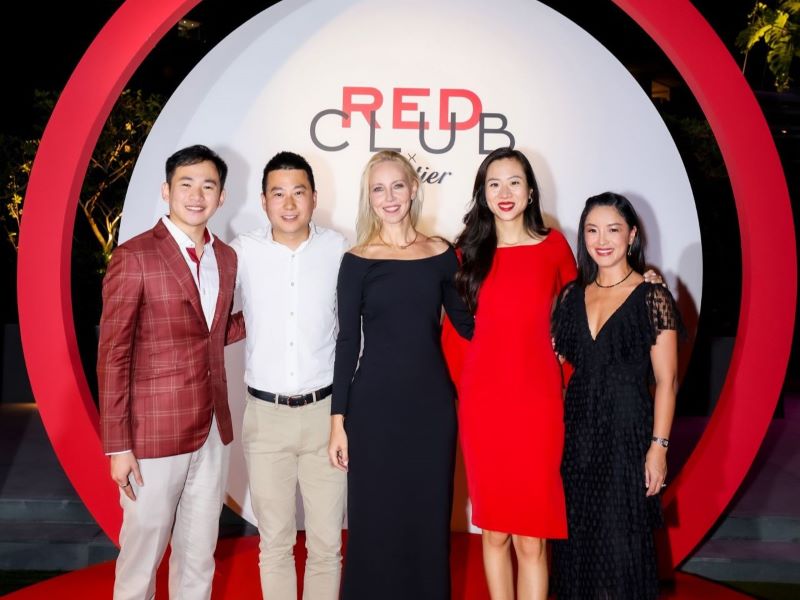
It is easy for business owners to be swept up in the metrics of success but profit can also be measured in lives touched and communities transformed.
“Enrico’s stories about cancer made me feel very conscious about our well-being because I’m close to 45 and I have two kids. Our loved ones and people around me, even young women, are getting cancer. How is this topic still a stigma? Why are we still not comfortable talking about it? Well, maybe Enrico will continue to develop technologies and solutions to tackle this sickness, but for now, the least we can do is spread the message and give others a chance to learn about them.”
Companies are looking into creating more value for society by converting vision into action, and Novitskaya believes the gear that sets this in motion is leadership.
“Everyone has some fire inside them. It’s not only because they’re troubled by something but it’s because they feel responsible. These enterprising individuals may lack the confidence but every finalist we saw in the past had an inner motivation to challenge the status quo. And that’s why I believe leaders, with a little encouragement, can be trained.”
Novitskaya confesses that she is more of a conscious leader. “Everyone wants to progress vertically but I’m fine with horizontal growth too. That’s because I find it crucial to build a sustainable work ecosystem where you can grow alongside your commercial channels and partnerships. And I’m glad to say at Cartier, we immediately support each other as soon as a crisis hits. Of course, as a mother, I feel upset that I don’t spend enough time with my kids but they understand why I’m working hard every day. It’s very important to involve your family or partner so they can be part of your life.”
Cut + Clarity
If the domains of business and entrepreneurship continue to evolve, so too must the awards and foundations — bodies that hold leaders accountable — that celebrate their champions. Last year’s YLA winner Dr Bea Bakshi, who founded UK-based C the Signs, which uses artificial intelligence (AI) to detect cancer early and swiftly, was pleased with the diversity of 2024’s cohort.
“As a female working in healthcare, I know how difficult it is to talk about, say, sanitary products and even recycling them, in the open. Entrepreneurship is not glamorous. I’m glad to see more representation among the founders because, unlike companies based in the US or Europe, it’s much harder to get start-ups off the ground in Asia. Suraj, who comes from a minority ethnic background, for example, will struggle to raise money compared with a white male counterpart. Women will usually get 2% of venture funding. Women of colour? Even less.
3_14.jpg
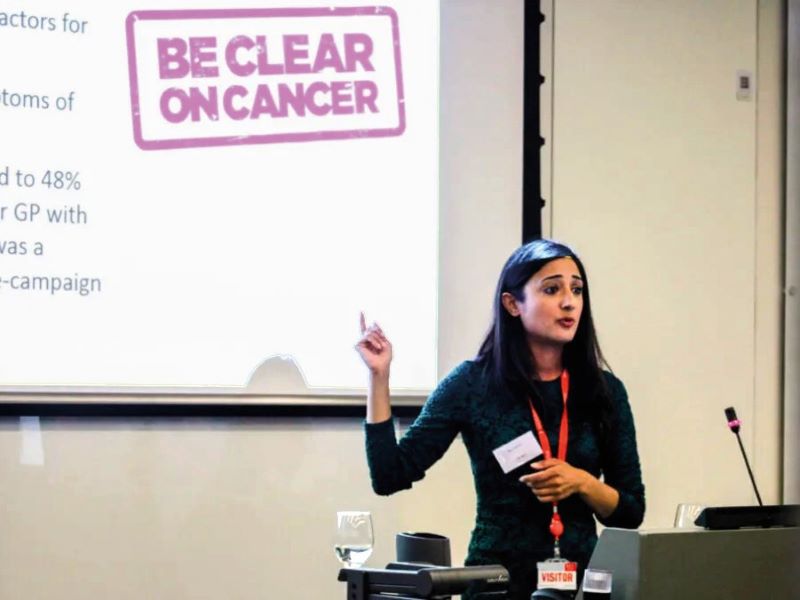
“In today’s climate, most grants come with criteria like ‘within two years, we need you to achieve this’, or ‘we need you to implement that’ because, at the end of the day, these organisations want the paperwork to stipulate the way you spent it and how amazing these numbers are. There’s a different kind of sincerity with Cartier because they trusted us with the money as long as we used it in a good way,” says Bakshi, who also received a curated mentorship programme with Georgetown University and Howard University in the US.
Healthcare professionals in the UK’s National Health Service utilise C the Signs’ screening tool, which can identify over 50 different types of cancer that a patient may be at risk of and what tests or referrals are needed next. The rate of detection has risen from 58.7% to 66% at GP practices (about 1,400 in England) using the AI-powered service.
“Earlier in my career as a junior doctor, I met a 47-year-old Muslim lady who was lying in the hospital bed and had her hand on the Quran. Three weeks before, she was dancing at her cousin’s wedding; now, suddenly she was completely incapacitated by ovarian cancer that had spread. How could you be fine a while ago and then get told by doctors you’re going to die? It’s just harrowing. But with AI triaging patients accurately, there is a chance we can diagnose these illnesses early. Every patient, anywhere in the world, has the right to survive cancer,” Bakshi says.
On the other side of the planet, Suraj’s bold leap into an environmental landscape fraught with mismanagement and broken policies was driven by a critical concern closer to home.
“In 2016, a very large landfill in Bombay caught fire. The plume of smoke, spread over 20km, was so dense that nobody could breathe. I had to relocate my family for seven to eight days. However, neither the government nor local waste management authorities had any answers to why it happened. Everyone kept blaming each other,” he laments.
5_2.jpg

“When the government set up the Clean India Movement called Swachh Bharat (a mass movement which exhorts citizens to fulfil Mahatma Gandhi’s dream of a hygienic India), I came in as a private party that created proper active waste management systems and geospatial solutions for the country, because in India, there are many cities within cities. So once I’ve solved the pain points, the government and stakeholders are more than happy to listen to me. I’m not giving them a vitamin but a painkiller for everyone’s problems.”
Inadequate infrastructure has compounded waste management system problems in rural and smaller towns where formal recycling facilities are practically non-existent. Apart from putting tech-enabled strategies in place, Suraj agrees that the nation can only reverse the tide of pollution by shifting public attitudes.
“Let’s look at the challenge of plastics, for example. In 2024, close to 200 million tonnes of plastic will be generated, of which 9% goes through recycling, 19% is burnt, 50% is dumped and 22% is leaked into the environment, causing a large ecological disaster. We tell these numbers not just to the people but also the children at school. They go home and tell their parents about it, and the adults, understanding the repercussions of waste, become ambassadors within their locality to action change. Yes, we’re a developing country and we may not necessarily have the highest standard of living, but we will get there.”
What sort of advice does he offer those wishing to follow in his footsteps?
“The average age of the employees in my company is 28. We bring young talent onto the company payroll and within 14 years, they can become the CEO. It’s a very clear path. You invest in people who give their time to the organisation. People don’t usually leave because they feel undervalued but because they become outskilled by the organisation. The least you can do as the head of the company is to lead with clarity. Don’t be distracted and stick to your mission. Hold your staff accountable so they learn about being responsible. Ultimately, you started a company because you wanted to work with the best people possible.”
The next Young Leader Award is set to take place in 2026. Applications will open in autumn 2025.
This article first appeared on Oct 28, 2024 in The Edge Malaysia.


